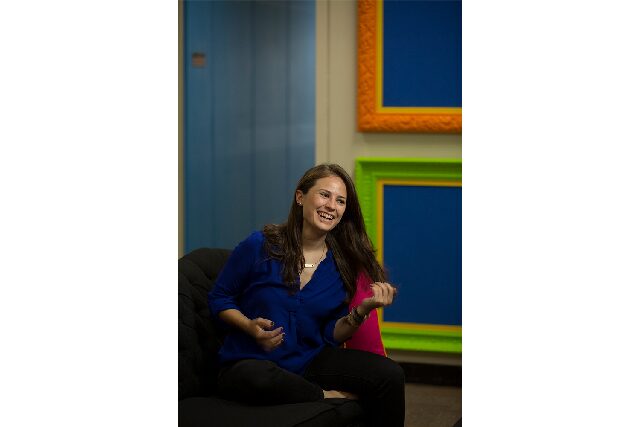Ask the Author | Samantha Zuhlke
In this week’s Ask the Author, geographer and political scientist Samantha Zuhlke, Ph.D., discusses her first book, “The Profits of Distrust,” which investigates why people drink bottled water instead of tap water.
November 15, 2022
Samantha Zuhlke is a geographer and political scientist. She received a bachelor’s in geography and political science from Colgate University and her doctorate in political science from Texas A&M University. She is an assistant professor at the University of Iowa’s School of Planning and Public Affairs. This year, she co-authored the book “The Profits of Distrust” with researchers Manuel P. Teodoro, an associate professor at the University of Wisconsin-Madison, and David Switzer, an assistant professor at the University of Missouri. On Feb. 16, Zuhlke will discuss the book as part of the “Book Matters” series at the Stanley Museum of Art.
The Daily Iowan: What is “Profits of Distrust” about?
Samantha Zuhlke: Our book answers this question: Why do people buy bottled water? Bottled water is kind of a paradox. It’s more expensive than tap water. It’s environmentally destructive, and it’s actually less regulated. So, the question is, why do people buy bottled water when most people in the U.S. have access to tap water that is more strictly regulated, less expensive, and more sustainable? That’s the big puzzle the book tries to answer.
What we find, and what we argue, is that the reason people are willing to spend extra on tap water is because they don’t trust the government to provide safe clean drinking water. Obviously, the government doesn’t always provide safe drinking water — look at the Flint water crisis or what’s happening in Jackson right now. But for the most part, most Americans have safe drinking water that comes out of their tap every day. And so, we argue the reason that people choose not to drink tap water is that they just don’t trust the government to provide basic services.
DI: What inspired you and your colleagues to research this issue?
Zuhlke: I’m originally from the Northeast, and I moved to Texas for grad school, and they had these water kiosks everywhere. Big standalone structures in parking lots where people can drive up, fill up a big jug of water, and drive away. And I’d never seen them before because we don’t really have them in the Northeast. In grad school, you have an advisor. And so, my advisor Manny asked me to look into where these [kiosks] were located because he’s not from Texas. He was like, “Let’s figure out with going on with these things” because they’re pretty expensive. It’s like 25 cents a gallon while tap water is pennies to the gallon. And you also have to put effort into making that trip. So, the question was, “Why is this happening?”
We started seeing that there were clear patterns to where these kiosks were located. Originally, we thought they might be a luxury good located in really wealthy neighborhoods because they’re that much more expensive. But what we were seeing is that they were located in the poorest neighborhoods in Houston and primarily located in Hispanic neighborhoods.
Originally we thought it would be a simpler story, that [the location of kiosks] might be related to water quality problems or income. And they were related to income, just not in the way we expected, and so it became this real mystery. Sometimes as a social scientist, you have the option of writing either a paper or a book, and sometimes an idea is too big for a paper. The answer to this mystery we felt was too big to put into a paper, so we decided to write a book about it instead.
DI: Why do you think this research, and other research like this, is important?
Zuhlke: When we look at government right now in the U.S., there is absolutely a lack of trust in our political institutions, and that’s really what our book is about. Our book is about drinking water, but the story is much bigger in that it’s really asking, “Why do people distrust the government?” Our answer for that is that people don’t trust the government in part because they don’t expect the government to provide basic services for them anymore. In social science words, that’s endogenous, meaning these things feed each other. So, if I don’t trust the government to provide safe drinking water, I am more likely to buy water from kiosks. That is what we call an exit from government because I’m no longer receiving services from government, and in turn that decreases government’s incentives to provide that basic service, and the quality of that service suffers. So, it becomes this vicious cycle where people don’t trust the government to provide services, they exit to private providers, and then the government has even less incentive to provide a good service. It just leads to this downward spiral. In the book, we show that people that drink bottled water are less likely to vote, less likely to partake in civic life, support political candidates, campaign — that sort of thing. Some groups of people have very good reason to distrust the government. In the book, we have 300 pages to talk about this. But in the short version, It’s rational for people to distrust the government. Sometimes government just needs to do a better job. Like Flint and Jackson, when those things happen, there’s consequences. So, distrust of government is not equally spread throughout society. It tends to be racial, ethnic, and lower-income groups. And those groups have good reason to distrust the government. So, government needs to do a better job of proactively providing better services to them.



